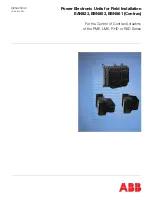
DocID018909 Rev 11
RM0090
USB on-the-go high-speed (OTG_HS)
1529
transfers, the HS_OTG host continues fetching the next packet (up to the value
specified in the MC field) before switching to the next channel.
c) The OTG_HS host attempts to send the OUT token at the beginning of the next
odd frame/micro-frame.
d) After successfully transmitting the packet, the OTG_HS host generates a CHH
interrupt.
e) In response to the CHH interrupt, reinitialize the channel for the next transfer.
•
Interrupt IN transactions in DMA mode
The sequence of operations (channelx) is as follows:
a) Initialize and enable channel x as explained in
Section : Channel initialization
b) The OTG_HS host writes an IN request to the request queue as soon as the
channel x gets the grant from the arbiter (round-robin with fairness). In high-
bandwidth transfers, the OTG_HS host writes consecutive writes up to MC times.
c) The OTG_HS host attempts to send an IN token at the beginning of the next (odd)
frame/micro-frame.
d) As soon the packet is received and written to the receive FIFO, the OTG_HS host
generates a CHH interrupt.
e) In response to the CHH interrupt, reinitialize the channel for the next transfer.
•
Isochronous OUT transactions in DMA mode
a) Initialize and enable channel x as explained in
Section : Channel initialization
b) The OTG_HS host starts fetching the first packet as soon as the channel is
enabled, and writes the OUT request along with the last DWORD fetch. In high-
bandwidth transfers, the OTG_HS host continues fetching the next packet (up to
the value specified in the MC field) before switching to the next channel.
c) The OTG_HS host attempts to send an OUT token at the beginning of the next
(odd) frame/micro-frame.
d) After successfully transmitting the packet, the HS_OTG host generates a CHH
interrupt.
e) In response to the CHH interrupt, reinitialize the channel for the next transfer.
•
Isochronous IN transactions in DMA mode
The sequence of operations ((channel x) is as follows:
a) Initialize and enable channel x as explained in
Section : Channel initialization
b) The OTG_HS host writes an IN request to the request queue as soon as the
channel x gets the grant from the arbiter (round-robin with fairness). In high-
















































